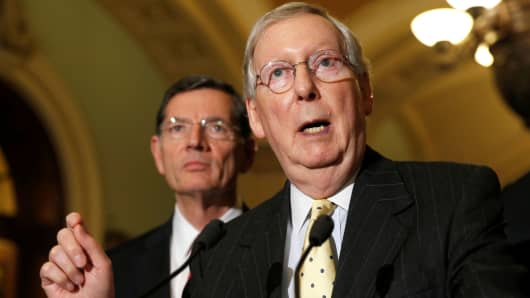None of this is going to work if the Republicans pushing for risk pools aren't as honest as possible with the American people. And the simple truth is that risk pools are still going to lose money. So when we talk about big money figures like $138 billion, or maybe even twice that, we have to remind ourselves about the overall premise: containment.
First, Senate Republicans need to be honest with themselves and ditch the House bill's long list of subsidy recipients. It would be naïve to think they'll have the guts to cut all premium subsidies to everyone above the Medicaid qualifying levels, but a serious paring is in order to make more funds available for the risk pools.
Second, the GOP will have to ask participants in the risk pools to pay more for their premiums than healthy people… within reason. Capping their premium payments at two or maybe three times the price of full plans for healthy people makes sense. That, and indexing their precise premium cost within that double or triple cap is more practical and fair.
And penalties will need to be added for people who never bought insurance and only do so when they are severely injured or get sick. Thus, a significant no-penalty bonus will then be bestowed on regularly insured people who become more ill or injured and have to slide into the risk pool.
Older customers who are still too young for Medicare will also have to pay higher premiums based on their income and with similar maximum caps.
Again, this is all necessary because Obamacare's promise that people with pre-existing conditions would pay the same average premium prices as everyone else was unsustainable and basically dishonest. Republicans will get pushback for asking them to pay more and the Republicans will have to find a way to make the case that a costlier reality is better than a freebie fantasy.
And the final piece of honesty we need to hear is the fact that because of the extremely pricey nature of treating people with pre-existing conditions, risk pools still won't be self-sufficient. That's even if every participant can afford those pricier premiums and pays up with 100 percent compliance. Over time, the costs will likely rise. The best hope is to keep those increases under relative control.
Because the most recent estimates put the overall annual cost of health care spending in America at $3.2 trillion. That is a whopping 17.8 percent of our GDP. And remember, just 5 percent of the public is responsible for half of that spending, or $1.6 trillion. Given those numbers, spending even $200 billion over the course of a decade or so to keep the spread of higher risk patients' costs from affecting the rest of us and our health insurance costs would be worth it. Even $300 billion, paid for from higher premium payments by risk pool members and mostly from specifically earmarked taxpayer funding will be worth it over that period of time.
The Republicans seem to always fail when it comes to making the case that their policies are just as, or even more compassionate, than anything the Democrats promote. They need to make it clear that Obamacare failed to show enough compassion to the overwhelming majority of Americans who were being asked to foot too much of a bill for a small minority whose care costs exponentially more than the rest of us.
Risk pools provide a much saner and ultimately more compassionate approach for everyone. Now it's up to the Republicans to make that simple case. If they don't, their Obamacare replacement efforts may be dead for good.
Commentary by Jake Novak, CNBC.com senior columnist. Follow him on Twitter @jakejakeny.
For more insight from CNBC contributors, follow @CNBCopinion on Twitter.



